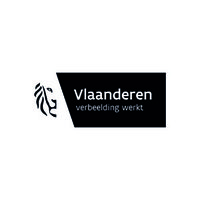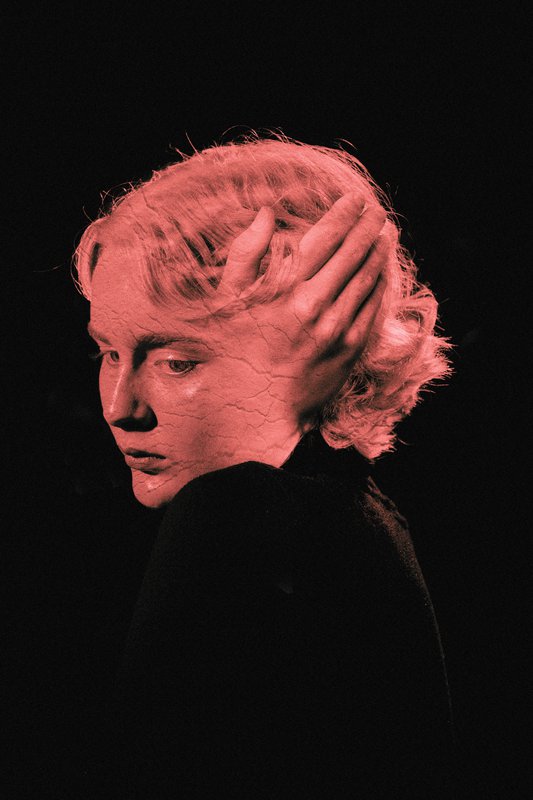Música
Directed by: Manuela Infante | Original text: Ovid | Concept and script: Manuela Infante | Adapted by: Michael de Cock and Manuela Infante | Cast: Hannah Berrada, Luna de Boos, Jurgen Delnaet | Music: Diego Noguera | Set and lighting design: Andrés Poirot | Audiovisual design: Pablo Mois | Script consultant: Kristin Rogghe | Lighting technician: Dimi Stuyven | Sound technician: Steven Lorie | Audiovisual technician: Gert Vanhyfte, Pier Gallen | Wardrobe: Nancy Colman | Stage director: Lieven Symaeys | General producer: Tanja Vrancken | Producer: Carmina Infante | Translator: Anne Vanderschueren (FR) | Subtitles: Inge Floré | A KVS Production | Coproduced by: the Teatro a Mil Foundation, La Rose des Vents - Scène Nationale Lille Métropole Villeneuve d’Ascq | Supported by Vlaamse Overheid, Hauts-de-France Region.
Manuela Infante
The director
Exploring the limits of creation
Between 2001 and 2016, director, playwright, screenwriter and musician Manuela Infante (1980) worked with the Teatro de Chile, one of the most outstanding Chilean companies of the last two decades, putting on the plays Prat, Cristo, Zoo and Realismo, among others. At the same time, she has carved out a career with her own creations - premiered all over the world - such as Fin, presented at the Festival of Modena; What’s he building in there?, created during an artistic residence at The Watermill Center; On the beach, curated by Bob Wilson and premiered at the Baryshnikov Arts Center in New York and Don’t feed the humans, premiered at the Hebbel am Uffer in Berlin.
Her work has been performed in America, Europe and Asia. Her participation in the
Venice Theater Biennale in 2019 (the first Chilean to be featured on the program) and winning the Stückemarkt award from the Treffen Theater in Berlin particularly stand out. Her latest pieces in Chile have been Estado vegetal (2017, named Best Play and Best Director by the Circle of Art Critics) and Idomeneo (2019).
Michael de Cock
The adaptor
Migration as a subject for theater
Born in 1972 in Belgium, this theater director, playwright and writer is currently the artistic director of the KVS Theater in Brussels. He graduated in Romance Languages and Literature and as an interpreter from the Brussels Conservatory. His work has been translated into more than ten languages and some of it has been turned into movies. His theater career includes staging classic texts such as Hedda Gabler and The Cherry Orchard, which was performed with a Senegalese-Belgian cast, although his most well-known project is a series of performances dedicated to immigration.
–To witness the interesting union of two renowned creators: Manuela Infante, whose research over the last few years has focused on what is beyond human life and understanding and Michael de Cock, artistic director of the KVS Theater in Brussels, whose play Mañana es otro país was part of Santiago a Mil 2020.
–Its interesting – and critical – rereading of Ovid’s work, which explores how the territory called ‘human’ has been patrolled by infinite tales of expulsion and sexual violence, reaffirmed in Western art history for centuries.
–The outstanding soundtrack and music brought to the stage by composer Diego Noguera, who processes the voices live. This makes Las metamorfosis a very musical play. Its creators describe it as “a piece full of noise, with the whole sonic landscape and music emerging exclusively as a result of taking the performers’ voices and processing them live”.
Ovid: This Latin poet was born in Sulmona (in today’s Italy) in 43 A.C. He worked as a politician in Rome and Greece, but then dedicated himself to poetry. As opposed to other poets like Virgil or Horace, his work distanced itself from the epic feats of war and focused on love and eroticism, with an emphasis on the idea of female seduction and conquest. His work cumulated in Las metamorfosis which, during the Middle Ages was considered an encyclopedia of classical mythology, bringing together historical myths whose main component was transfiguration. He died in Constanta (in today’s Rumania) in 17 D.C.
-Take a look at the plays by KVS Theater on their Youtube channel










Las Metamorfosis
Directed by Manuela Infante | Adapted by Michael de Cock and Manuela Infante | Original text by Ovid
- Belgium
- Chile
- France
- English with Spanish subtitles
- 90 minutes
- + 14 years
Two great creators come together in a vocal piece that explores how the territory called ‘human’ has been patrolled by infinite tales of expulsion and sexual violence, repeated for centuries in Western art history.
Las metamorfosis by Ovid is an inventory of the transformation myths that – 2,000 years ago – challenged the idea of a permanent division between what’s human and what’s not. Specifically – and problematically – though, the majority of these transformations turn out to be the result of violence aimed at women. A critical look at Ovid’s poem provides a more in-depth exploration of how the notion of ‘human’ became part of the foundations of Western culture by making forms of expulsion and sexual violence - reaffirmed for years in Western art history - more aesthetic.
Either as a form of escape or punishment, nymphs and women turn into cows, trees and rivers, losing their ability to speak. This adaptation of Las metamorfosis by Manuela Infante and Michael de Cock, however, doesn’t aim to ‘give them a voice’ or restore their human ones but rather to question the worn-out metaphor of ‘voices’ as a form of agency.
In the play’s artificial, en-chanted landscape, voices are not an expression of privacy, reason or human agency but rather entities on the wind that weave together humans and non-humans in an unending stream of ventriloquism, reverberations and echoes. Without ever belonging to anyone, voices are dislocated, flee and are transformed.
Las metamorfosis is a collection of vampirized versions of Western foundational myths, working with voices – sung, murmured, stammered or squealed – to lay bare their inhuman otherness. It challenges the divisions that these very myths have reaffirmed for centuries – human and non-human, culture and nature, sound and meaning, man and woman.
Can the voices of rivers, trees, insects or animals act as a sonic threshold for other forms of – unexpected – eloquence, disrupting the borders of the territory we call ‘human’?
In this piece, Manuela Infante continues her collaboration with musician Diego Noguera, who she worked with on the play Idomeneo, exploring how to process voices using modular synthesizers. Las metamorfosis is a piece full of noise, with the whole sonic landscape and music emerging exclusively as a result of taking the performers’ voices and processing them live.

Directed by: Manuela Infante | Original text: Ovid | Concept and script: Manuela Infante | Adapted by: Michael de Cock and Manuela Infante | Cast: Hannah Berrada, Luna de Boos, Jurgen Delnaet | Music: Diego Noguera | Set and lighting design: Andrés Poirot | Audiovisual design: Pablo Mois | Script consultant: Kristin Rogghe | Lighting technician: Dimi Stuyven | Sound technician: Steven Lorie | Audiovisual technician: Gert Vanhyfte, Pier Gallen | Wardrobe: Nancy Colman | Stage director: Lieven Symaeys | General producer: Tanja Vrancken | Producer: Carmina Infante | Translator: Anne Vanderschueren (FR) | Subtitles: Inge Floré | A KVS Production | Coproduced by: the Teatro a Mil Foundation, La Rose des Vents - Scène Nationale Lille Métropole Villeneuve d’Ascq | Supported by Vlaamse Overheid, Hauts-de-France Region.
Manuela Infante
The director
Exploring the limits of creation
Between 2001 and 2016, director, playwright, screenwriter and musician Manuela Infante (1980) worked with the Teatro de Chile, one of the most outstanding Chilean companies of the last two decades, putting on the plays Prat, Cristo, Zoo and Realismo, among others. At the same time, she has carved out a career with her own creations - premiered all over the world - such as Fin, presented at the Festival of Modena; What’s he building in there?, created during an artistic residence at The Watermill Center; On the beach, curated by Bob Wilson and premiered at the Baryshnikov Arts Center in New York and Don’t feed the humans, premiered at the Hebbel am Uffer in Berlin.
Her work has been performed in America, Europe and Asia. Her participation in the
Venice Theater Biennale in 2019 (the first Chilean to be featured on the program) and winning the Stückemarkt award from the Treffen Theater in Berlin particularly stand out. Her latest pieces in Chile have been Estado vegetal (2017, named Best Play and Best Director by the Circle of Art Critics) and Idomeneo (2019).
Michael de Cock
The adaptor
Migration as a subject for theater
Born in 1972 in Belgium, this theater director, playwright and writer is currently the artistic director of the KVS Theater in Brussels. He graduated in Romance Languages and Literature and as an interpreter from the Brussels Conservatory. His work has been translated into more than ten languages and some of it has been turned into movies. His theater career includes staging classic texts such as Hedda Gabler and The Cherry Orchard, which was performed with a Senegalese-Belgian cast, although his most well-known project is a series of performances dedicated to immigration.
–Para ver la interesante conjunción de dos reconocidos creadores: Manuela Infante, quien en los últimos años ha seguido una línea de investigación que indaga en lo que hay más allá de la vida y entendimiento humanos, y Michael de Cock, director artístico del teatro KVS de Bruselas, quien estuvo en Santiago a Mil 2020 con su obra Mañana es otro país.
–Por su interesante, y crítica, relectura de la obra de Ovidio, que explora cómo ese territorio llamado “humano” ha sido patrullado mediante infinitos relatos de expulsión y violencia sexual reiterados por siglos en la historia del arte occidental.
–Por el destacado trabajo sonoro y música llevado a escena por el compositor musical Diego Noguera, quien procesa las voces en vivo. Esto convierte a Las metamorfosis en una obra muy musical Tal como definen sus creadores: “Las metamorfosis es una obra noise, en la que todo el paisaje sonoro y la música surgen únicamente de la cosecha y procesamiento en vivo de las voces de lxs intérpretes”.
Ovidio: Poeta latino, nacido en Sulmona (hoy Italia) en el año 43 a.C. Se formó en Roma y Grecia como político, pero luego derivó en la poesía. Su obra, a diferencia de otros poetas como Virgilio u Horacio, se aleja de las gestas épicas de la guerra y se centra en el amor y el erotismo, con un marcado énfasis en la idea de la seducción femenina y la conquista. Su obra cumbre es Las metamorfosis, que durante la Edad Media fue considerada una verdadera enciclopedia de la mitología clásica; en ella, el poeta reúne aquellas historias míticas cuyo componente principal era la transfiguración. Murió en Constanza (hoy Rumania), en el año 17 d.C.
-Revisa la programación del teatro KVS en su canal de Youtube
COLABORA









